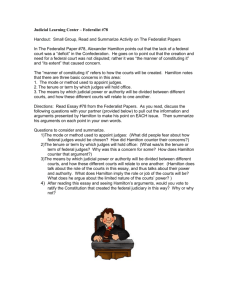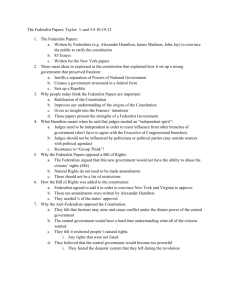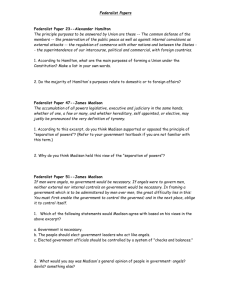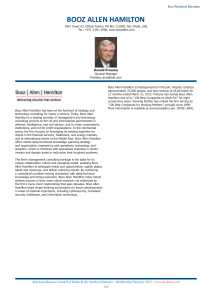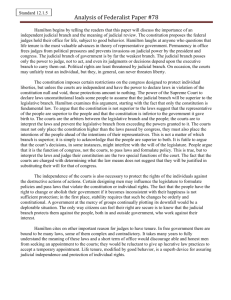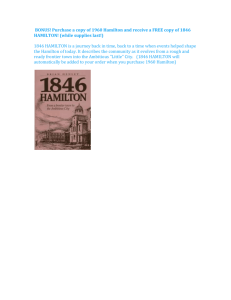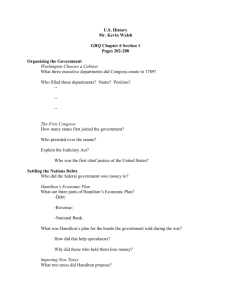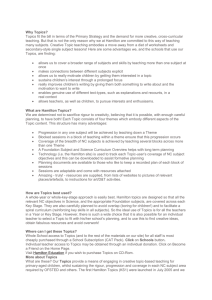The Federalist Number 78
advertisement
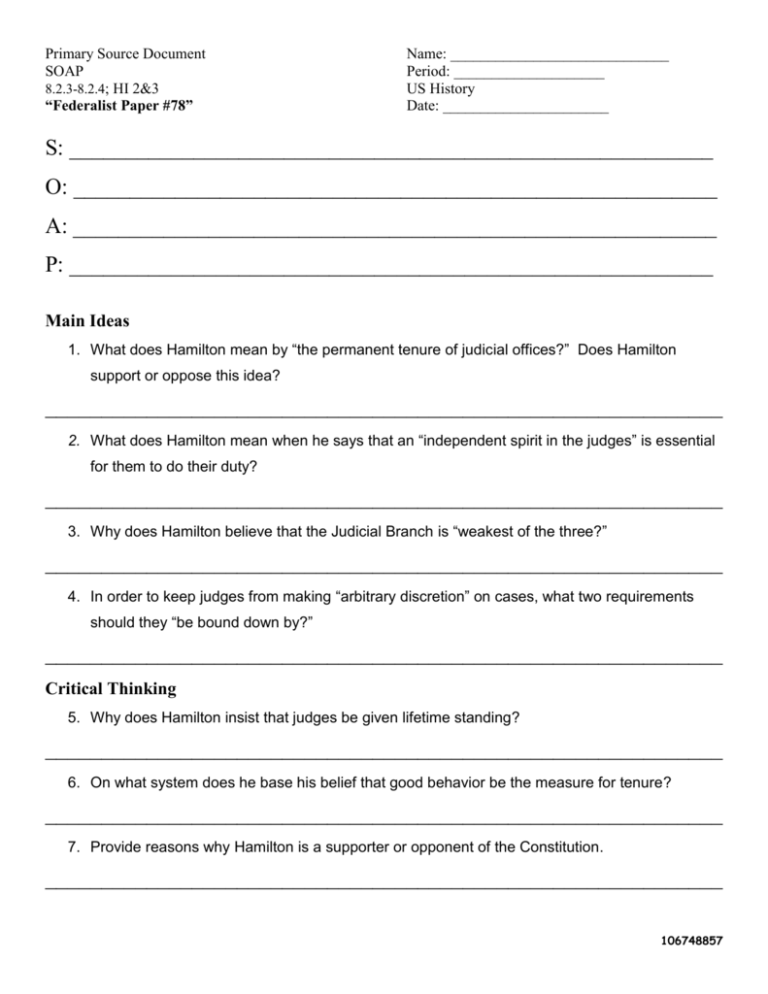
Primary Source Document SOAP 8.2.3-8.2.4; HI 2&3 “Federalist Paper #78” Name: _____________________________ Period: ____________________ US History Date: ______________________ S: _________________________________________________________ O: _________________________________________________________ A: _________________________________________________________ P: _________________________________________________________ Main Ideas 1. What does Hamilton mean by “the permanent tenure of judicial offices?” Does Hamilton support or oppose this idea? ____________________________________________________________ 2. What does Hamilton mean when he says that an “independent spirit in the judges” is essential for them to do their duty? ____________________________________________________________ 3. Why does Hamilton believe that the Judicial Branch is “weakest of the three?” ____________________________________________________________ 4. In order to keep judges from making “arbitrary discretion” on cases, what two requirements should they “be bound down by?” ____________________________________________________________ Critical Thinking 5. Why does Hamilton insist that judges be given lifetime standing? ____________________________________________________________ 6. On what system does he base his belief that good behavior be the measure for tenure? ____________________________________________________________ 7. Provide reasons why Hamilton is a supporter or opponent of the Constitution. ____________________________________________________________ 106748857 Federalist Paper #78 Of the three known authors of the Federalist Papers, Alexander Hamilton is believed to have published the most – his 52 essays outlining the need for the Constitutional were published in several prominent New York papers. In an effort to keep his political office from tainting people’s judgment, Hamilton and the authors of the Federalist Papers always ended each essay with the name PUBLIUS. In The Federalist “Number 78,” Hamilton explains the qualifications and privileges granted to judges under this new government. “If then the courts of justice are to be considered as the bulwarks1 of a limited constitution against legislative encroachments, this consideration will afford a strong argument for the permanent tenure of judicial offices, since nothing will contribute so much as this to that independent spirit in the judges, which must be essential to the faithful performance of so arduous2 a duty. This independence of the judges is equally requisite to guard the constitution and the rights of individuals from the effects of . . . designing men. …In a government in which they are separated from each other, the judiciary, from the nature of its functions, will always be the least dangerous to the political rights of the Constitution…the judiciary is beyond comparison the weakest of the three departments of power; that it can never attack with success either of the other two…it equally proves, that though individual oppression may now and then proceed from the courts of justice, the general liberty of the people can never be endangered from that quarter…the independence of the judges may be an essential safeguard against the effects of occasional ill humors3 in the society..... There is yet a further and a weightier reason for the permanency of the judicial offices…To avoid an arbitrary discretion 4 in the courts, it is indispensable that they should be bound down by strict rules and precedents 5, which serve to define and point out their duty in every particular case that comes before them. Hence it is, that there can be but few men in the society who will have sufficient skill in the laws to qualify them for the stations of judges...These considerations apprise6 us, that the government can have no great option between fit character; and that a temporary duration in office, which would naturally discourage such characters from quitting a lucrative7 line of practice to accept a seat on the bench, would have a tendency to throw the administration of justice into hands less able, and less well qualified, to conduct it with utility and dignity. Upon the whole, there can be no room to doubt that the (Constitutional) convention acted wisely in copying from the models of those constitutions which have established GOOD BEHAVIOR as the tenure of their judicial offices, in point of duration; and that so far from being blamable on this account, their plan would have been inexcusably defective, if it had wanted this important feature of good government. The experience of Great Britain affords an illustrious comment on the excellence of the institution.” United States. Gary Rutledge. “Fed No. 78.” 14 June. 1788; http://www.garyrutledge.com/Documents/federalists_papers/fed_78.htm> 1. bulwarks: a guard against illegal acts committed to undermine people’s rights 2. arduous: difficult 3. ill humors: harmful outcomes 4. arbitrary discretion: on personal preference rather than the rule of law 5. precedent: an earlier action that must be followed later pleasure: one’s wish or whim 6. apprise: tell 7. lucrative: profitable 106748857
